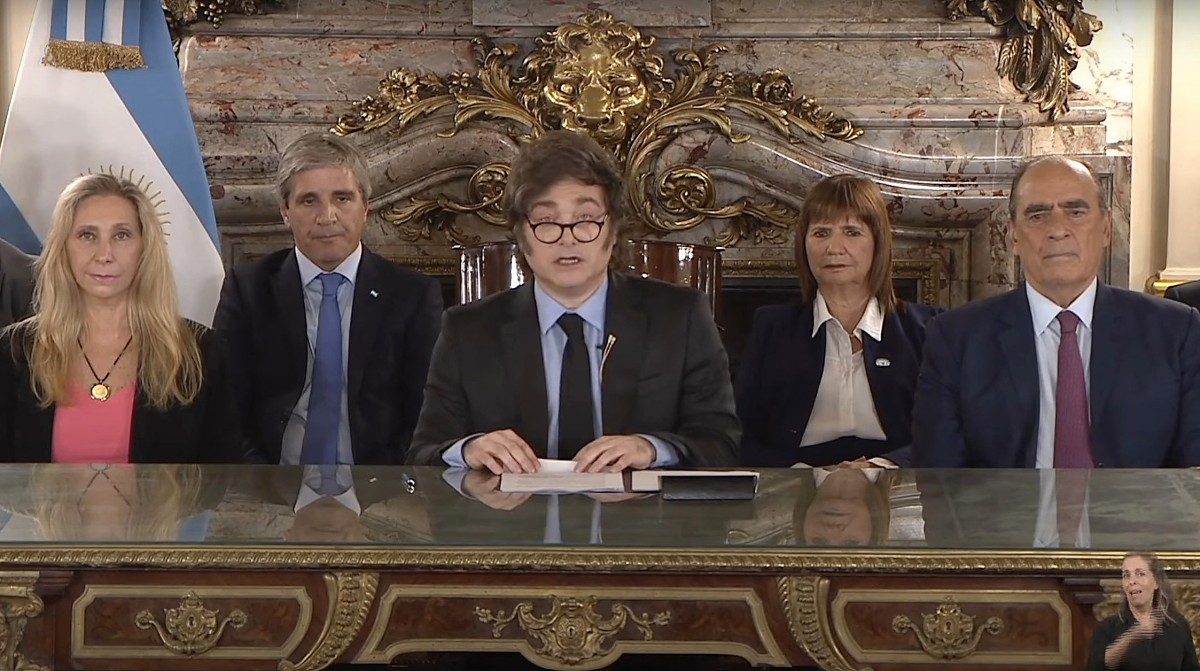Argentina secures new $20-billion bailout from IMF

This screen grab taken on April 11, 2025, from an official government TV broadcast shows Argentina’s President Javier Milei (center) announcing the new agreement with the International Monetary Fund. (Photo by Argentina’s Presidency Press Office / AFP)
WASHINGTON, United States/BUENOS AIRES, Argentina — The International Monetary Fund on Friday approved a new four-year $20 billion bailout for Argentina.
This will support President Javier Milei’s aggressive efforts to revive the fortunes of the Latin American country.
“The program is expected to help catalyze additional official multilateral and bilateral support, and a timely re-access to international capital markets,” the IMF said in a statement.
The executive board’s decision makes an initial disbursement of $12 billion immediately available to Argentina, with the first review of the program scheduled for June this year.
It is the 23rd time the IMF has bailed out Argentina since it became a member of the Washington-based institution in 1956.
Minutes before the IMF statement arrived on Friday, the World Bank announced a separate “support package” of measures worth some $12 billion.
The package includes commitments from three different World Bank bodies. It “is designed to support reforms that continue to attract private investment and further boost the measures being implemented by the national government to promote job creation,” the Bank said in a statement.
Easing of forex controls
Argentina’s government said Friday the agreement with the IMF also involves the easing of foreign exchange controls.
The landmark deal will give cash-strapped Argentina more financial firepower to defend its wobbling currency, and is a political boon for the libertarian Milei.
The loan, which must still be greenlit by the executive board of the global lender, will allow the “recapitalization of the Central Bank… and continue the disinflation process,” Economy Minister Luis Caputo told reporters.
It would also, starting Monday, “allow us to end the exchange controls that have done so much harm” to Argentines, and “affected the normal functioning of the economy,” said the minister.
READ: Argentina’s Milei praises Trump plan for reciprocal tariffs
The IMF will disburse $15 billion of the loan to be available this year, the government said.
In place of exchange controls in place since 2019, the peso will be allowed to float within a band of between 1,000 and 1,400 pesos to the dollar, the Central Bank added in a statement.
On Friday, the peso traded at 1,097 to the dollar at the official rate, and at 1,375 at the unofficial “blue” rate.
The Central Bank said the $200-per-month limit on Argentine citizens accessing greenbacks will also be lifted.
Under the deal, the differential exchange rate for exporters will be eliminated. Meanwhile, the distribution of profits to foreign shareholders is allowed starting from the financial years beginning in 2025. Also, the deadlines for the payment of foreign trade operations are relaxed.
Inflation down
Argentina, Latin America’s third-biggest economy with a record of economic crises, hyperinflation and defaults, already owes the IMF $44 billion under a 2018 loan agreement. This is the IMF’s biggest loan ever, on which Buenos Aires has since renegotiated the repayment terms.
Milei, Argentina’s budget-slashing president, assumed office in December 2023. He has sought a new loan to cancel Treasury debt to the Central Bank, wipe out stubborn inflation, boost growth and replenish foreign reserves.
The prospect of another IMF loan has caused a run on the peso, prompted by fears — which Milei has rebuffed — that a new deal could entail a currency devaluation.
The IMF has expressed approval of Milei’s attempts to curb inflation. The metric came in higher at 3.7 percent for the month of March compared to 2.4 percent in February.
Annual inflation came in at 55.9 percent in March, down from 211 percent at the end of 2023. Still, it is one of the highest rates in the world.
Milei, a self-declared “anarcho-capitalist,” has fired tens of thousands of public sector workers. He also halved the number of government ministries and vetoed inflation-aligned pension increases to curb public spending.